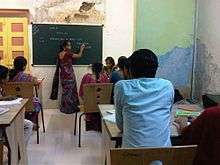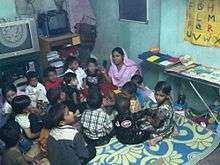Pratham
|
Logo | |
| Motto | Every Child in School & Learning Well |
|---|---|
| Type | Not for profit |
| Headquarters | Mumbai, Delhi |
| Location |
|
Region served | India |
CEO | Dr. Rukmini Banerji |
| Website | www.pratham.org |
Pratham is one of the largest non-governmental organisations in India.[1] It was co-founded by Madhav Chavan and Farida Lambay . It works towards the provision of quality education to the underprivileged children in India. Established in Mumbai in 1994 to provide pre-school education to children in slums, Pratham today has interventions spread across 23 states and union territories of India [2] and has supporting chapters in the United States, UK, Germany and UAE.
Pratham’s founder and Ex-CEO, Madhav Chavan, was the 2011 recipient of the Skoll Award for Social Entrepreneurship.[3] In addition, Pratham received the 2013 BBVA Foundation Frontiers of Knowledge Award in Development Cooperation, as a result of successfully catering to the learning needs of tens of millions of disadvantaged children for over twenty years. In doing so, it has designed and implemented new methods that accelerate reading acquisition, using a grassroots approach in which pupils are grouped by actual levels and needs instead of age, while providing specific training to the teachers and volunteers recruited to its programs.
History

UNICEF originally set up the Bombay Education Initiative in Mumbai to establish a tripartite-partnership between the government, corporate and civil society to improve India’s primary education. This led to the formation of Pratham as an independent charity in 1994.
Pratham started by holding balwadis (pre-education classes) for children in Mumbai’s slums. Volunteers were recruited to teach in spaces within communities, including temples, offices, and even people’s homes. The Pratham pre-school classes multiplied and were replicated in other locations.[5]

Mission
Pratham’s mission is “Every Child in School and Learning well”. By increasing the literacy levels of India’s poor which account for about one third of the world’s poor, Pratham aims to improve India’s economic and social equality. This is carried out through the introduction of low cost education models that are sustainable and reproducible.[6]
Work
Annual Status of Education Report (ASER), India’s largest NGO-run annual survey, has been conducted by Pratham since 2005 to evaluate the relevance and impact of its programs. Findings are disseminated at national, state, district and village levels, and influence education policies at both state and central levels.[7]
Read India - Despite India’s educational reforms in recent years, quality education is still a concern, especially among low-income communities.[8] Findings of ASER 2005 and 2006 revealed that 50% of children in government schools could not read, write or do basic arithmetic despite being in school for 4–5 years.[9] Hence Read India was launched in 2007 to improve reading, writing and basic arithmetic skills of 6- to 14-year-old children and is carried out by school teachers, anganwadi workers and volunteers, whom Pratham trains. Read India has reached approximately 34 million children to date, resulting in large-scale improvements in literacy levels across several states in India.[10]
Pratham Books, a non-profit organisation which publishes affordable, quality books for children, was set up in 2004 to complement Read India. It has published over 200 original titles in 10 Indian languages and reached over 14 million children.[11]
Direct programmes – Pratham’s direct programmes seek to supplement governmental efforts to improve quality of education through balwadis (pre-school education), learning support programs, libraries and mainstreaming drop-out children. Full-year learning support is provided at centres for children living in the immediate vicinity. These programmes are typically conducted in urban slums or poor villages, where children do not have easy access to quality education.[12]
Lakhon Mein Ek is a call-to-action campaign by Pratham Education Foundation and ASER Centre. Together with citizens from across the country, the organisation worked towards improving the status of children's learning in 100,000 villages and communities.
The campaign started on October 21, 2015 and by January 11, 2016, the campaign had reached more than 150,000 villages and communities. Furthermore, over 300,000 volunteers had joined the campaign and interacted with about 1 crore (10 million) children.
By January 16, 2016 success of the campaign will be marked by citizens everywhere resolving to help children acquire basic reading and math abilities in these locations.[13]
Other Work - Pratham has also set up other programmes for disadvantaged Indian children and youth, including Pratham Council for Vulnerable Children (PCVC), Early Childhood Care and Education Centre (ECCE), Vocational Skills Programme, and Computer-aided Literacy.[14]
Further reading
Computer Assisted Learning Project with Pratham in India Banerjee, Abhijit, Shawn Cole, Esther Duflo, and Leigh Lindon. 2007. “Remedying Education: Evidence From Randomized Experiments in India.” The Quarterly Journal of Economics 122(3): 1235-1264.
Educational Incentives for Parents and Children in India Berry, James. "Child Control in Education Decisions: An Evaluation of Targeted Incentives to Learn in India." Working Paper, Cornell University, June 2011.
Bridge Classes and Peer Networks Among Out-of-School Children in India Berry, James, and Leigh Linden. "Bridge Classes and Peer Networks among Out-of-school Children in India." Working Paper, MIT, March 2009.
Read India: Helping Primary School Students in India Acquire Basic Reading and Math Skills
Hope Amidst Despair. An account of the lives and hopes of Pratham Children. 2006, Narain, Chetan
Sustaining Hope. Five Years Later. An account of the lives and hopes of Pratham Children. 2011 Narain, Akshar
3 R's and an M Teaching music in the slums of India. 2013 Narain, Akshar
External reviews
GiveWell review
In November 2011, US-based charity evaluator GiveWell identified Pratham as one of six "standout" organisations to give to in its list of top charities. This placed Pratham below the top-ranked charities Against Malaria Foundation and Schistosomiasis Control Initiative and alongside Innovations for Poverty Action, GiveDirectly, KIPP (Houston branch), Nyaya Health, and Small Enterprise Foundation.[15] GiveWell also lists Pratham as its top charity in the developing world education category.
GiveWell has also published a detailed review of Pratham, last updated in March 2012.[16]
References
- ↑ "Murthy named to Pratham DC board". 22 Feb 2012. Retrieved 10 May 2012.
- ↑ "Kravis Prize Awardee". Claremont McKenna College.
- ↑ "Skoll award for Madhav Chavan and Pratham". India Post.
- 1 2 Photo courtesy GiveWell.
- ↑ "Pratham History".
- ↑ "Pratham Harvard Business School" (PDF).
- ↑ "Pratham ASER".
- ↑ http://www.povertyactionlab.org/evaluation/read-india-helping-primary-school-students-india-acquire-basic-reading-and-math-skills
- ↑ "ASER Report 2005" (PDF).
- ↑ "Pratham's Contributions to Indian Education Policy Debate".
- ↑ "The Times of India Social Impact Awards". The Times Of India.
- ↑ "Pratham Direct Programmes".
- ↑ "Home". Lakhon Mein Ek. Pratham Education Foundation. Retrieved 2015-10-21.
- ↑ "Pratham Fact Sheet".
- ↑ "GiveWell top-rated charities". GiveWell. Retrieved 2011-12-19.
- ↑ "Pratham (charity review)". GiveWell.
External links
| Wikimedia Commons has media related to Pratham Gallery. |
